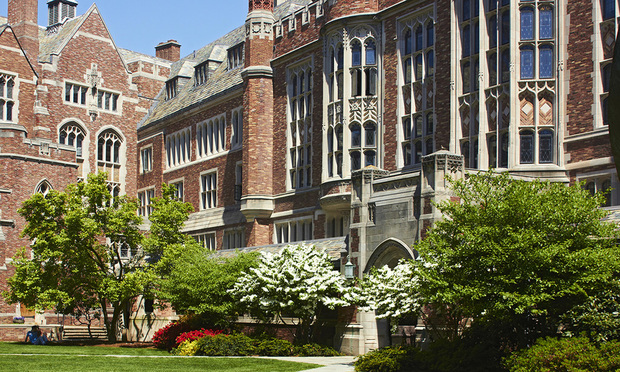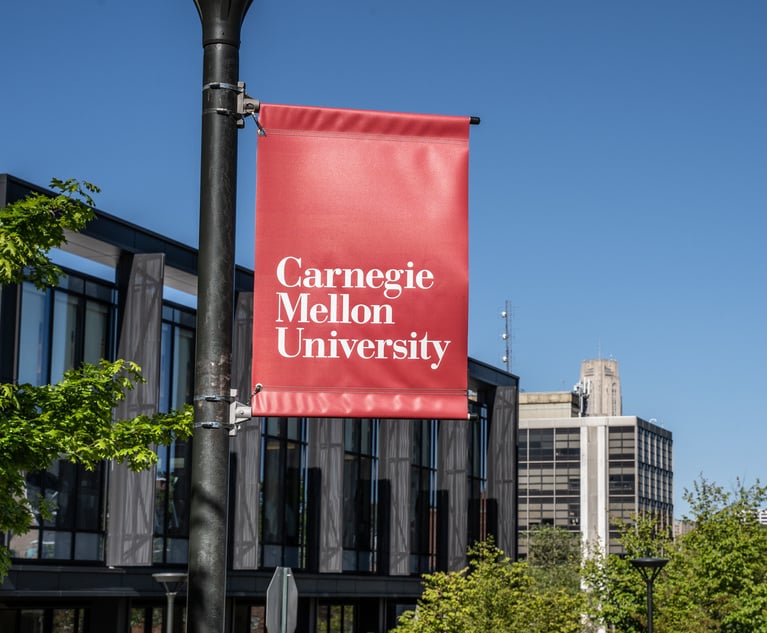Two From Pa. Make Yale Law Group's List of Top 10 Family-Friendly Law Firms
A Yale Law School group has identified its top 10 law firms for gender equity and family friendliness, giving kudos to two Pennsylvania law firms in the latter category while still finding plenty of room for improvement in Big Law overall.
April 16, 2019 at 11:25 AM
5 minute read
The original version of this story was published on The American Lawyer
 Yale Law School. (Courtesy photo)
Yale Law School. (Courtesy photo)
A Yale Law School group has identified its top 10 law firms for gender equity and family friendliness, giving kudos to Dechert and Reed Smith in the latter category while still finding plenty of room for improvement in Big Law overall.
Yale Law Women, a group dedicated to the advancement of women at the university and in the profession, surveyed more than 50 Big Law firms, examining their policies around family leave and gender equality. These responses were then weighted against responses from male and female Yale alumni currently working at those firms.
Last year was the first time the report broke out the two lists to include a “female-friendly” category. This year—the group's 14th year releasing the roster—the category was changed to gender equality to capture the experiences of both female and gender nonconforming individuals, said Elizabeth Levin, a second-year law student at Yale and co-chairwoman of the survey committee.
“It's not just the experiences of female attorneys that impact whether a firm is gender equitable, but the experiences of nonconforming women,” Levin said.
The Yale Law Women report comes as a series of gender bias lawsuits and proposed class actions against major law firms has shined a light on claims that firms discriminate against women and mothers. At least one of the firms fighting those claims, Morrison & Foerster, made the Yale gender equality top 10 this year.
To calculate gender equity among the firms, the Yale Law Women report looked at the representation of women within a firm's structure and leadership, as well as promotions and evidence of commitment to equitable training and mentorship.
Yale Law Women's top 10 firms for gender equality in 2019, listed in alphabetical order, are: Bryan Cave (now Bryan Cave Leighton Paisner); Fish & Richardson; Hogan Lovells; Littler Mendelson; McDermott Will & Emery; Morrison & Foerster; Perkins Coie; Sheppard, Mullin, Richter & Hampton; Squire Patton Boggs; and Steptoe & Johnson LLP.
In determining the most family-friendly law firms, Yale Law Women focused on three categories: “(1) the structure and expectations surrounding billable hours and compensation at a firm; (2) the availability and use of parental and family leave accommodations; and (3) the availability and use of part-time and flexible work schedules.”
The top 10 firms for family friendliness, in alphabetical order, are Akin Gump Strauss Hauer & Feld; Dechert; Fish & Richardson; Goodwin Procter; Morrison & Foerster; Orrick, Herrington & Sutcliffe; Reed Smith; Sheppard Mullin; Steptoe; and Vinson & Elkins.
Including all of the firms surveyed, 46.3 percent of associates were women, 20.3 percent of equity partners were women and 29.8 percent of lawyers promoted to equity partner were women. That marks a dip from last year's survey, where women made up 36 percent of equity partner promotions.
“I think that a takeaway every year is how much room there is for improvement,” Levin said.
The report also found that women made up only 18.7 percent of managing partners at the firms surveyed.
“At the higher levels the firms are really seeing huge gender gaps,” said Anna Kaul, a first-year law student and co-chairwoman of publications and outreach.
But firms did make some strides over the last year, and two other Pennsylvania firms—Blank Rome and Morgan, Lewis & Bockius—both received high marks in several subcategories.
Last year only three firms surveyed had more than 25 percent female equity partners. This year eight law firms met that target: Hogan Lovells; Kilpatrick Townsend & Stockton; Kirkland & Ellis; Littler; Morgan Lewis; Morrison & Foerster; Ropes & Gray; and Wilmer Cutler Pickering Hale and Dorr.
Blank Rome and Morgan Lewis were also two of only four firms identified in the report whose new partner classes in 2018 comprised at least 50 percent women. The other two firms were Hogan Lovells and Morrison & Foerster.
In addition, Blank Rome had one of the highest percentages of associates who are men taking caregiver leave, along with Kilpatrick Townsend & Stockton; Munger, Tolles & Olson; and Pillsbury Winthrop Shaw Pittman.
Blank Rome also received honors for being one of four firms whose equity partner promotions in 2018 included the highest percentage of attorneys who had worked part-time schedules in the past five years. The other three firms on that list were Fish & Richardson, Hogan Lovells and Morrison & Foerster.
The report also included a new section about the use of mandatory arbitrations within law firms, a practice that has been the subject of much scrutiny across law school campuses.
The report found that 10.6 percent of law firms surveyed required their junior and senior associates to sign a mandatory arbitration contract regarding at least some types of disputes as a condition of employment while over 30 percent of firms required equity partners to sign a mandatory arbitration contracts.
And of the firms that disclosed their arbitration policies, 8.5 percent required junior and senior associates to sign a mandatory arbitration agreements that covered allegations of sexual assault or sexual misconduct as a condition of employment, while 20.9 percent of the firms that disclosed required equity partners to do the same.
Zack Needles contributed to this report.
This content has been archived. It is available through our partners, LexisNexis® and Bloomberg Law.
To view this content, please continue to their sites.
Not a Lexis Subscriber?
Subscribe Now
Not a Bloomberg Law Subscriber?
Subscribe Now
NOT FOR REPRINT
© 2025 ALM Global, LLC, All Rights Reserved. Request academic re-use from www.copyright.com. All other uses, submit a request to [email protected]. For more information visit Asset & Logo Licensing.
You Might Like
View All
Sanctioned Penn Law Professor Amy Wax Sues University, Alleging Discrimination
5 minute read
Pa. Superior Court: Sorority's Interview Notes Not Shielded From Discovery in Lawsuit Over Student's Death
3 minute read
LSAT Administrator Sues to Block AI Tutor From Using ‘Famous, Distinctive’ Test Prep Materials
3 minute read
Disjunctive 'Severe or Pervasive' Standard Applies to Discrimination Claims Against University, Judge Rules
5 minute readTrending Stories
- 1Two Wilkinson Stekloff Associates Among Victims of DC Plane Crash
- 2Two More Victims Alleged in New Sean Combs Sex Trafficking Indictment
- 3Jackson Lewis Leaders Discuss Firm's Innovation Efforts, From Prompt-a-Thons to Gen AI Pilots
- 4Trump's DOJ Files Lawsuit Seeking to Block $14B Tech Merger
- 5'No Retributive Actions,' Kash Patel Pledges if Confirmed to FBI
Who Got The Work
J. Brugh Lower of Gibbons has entered an appearance for industrial equipment supplier Devco Corporation in a pending trademark infringement lawsuit. The suit, accusing the defendant of selling knock-off Graco products, was filed Dec. 18 in New Jersey District Court by Rivkin Radler on behalf of Graco Inc. and Graco Minnesota. The case, assigned to U.S. District Judge Zahid N. Quraishi, is 3:24-cv-11294, Graco Inc. et al v. Devco Corporation.
Who Got The Work
Rebecca Maller-Stein and Kent A. Yalowitz of Arnold & Porter Kaye Scholer have entered their appearances for Hanaco Venture Capital and its executives, Lior Prosor and David Frankel, in a pending securities lawsuit. The action, filed on Dec. 24 in New York Southern District Court by Zell, Aron & Co. on behalf of Goldeneye Advisors, accuses the defendants of negligently and fraudulently managing the plaintiff's $1 million investment. The case, assigned to U.S. District Judge Vernon S. Broderick, is 1:24-cv-09918, Goldeneye Advisors, LLC v. Hanaco Venture Capital, Ltd. et al.
Who Got The Work
Attorneys from A&O Shearman has stepped in as defense counsel for Toronto-Dominion Bank and other defendants in a pending securities class action. The suit, filed Dec. 11 in New York Southern District Court by Bleichmar Fonti & Auld, accuses the defendants of concealing the bank's 'pervasive' deficiencies in regards to its compliance with the Bank Secrecy Act and the quality of its anti-money laundering controls. The case, assigned to U.S. District Judge Arun Subramanian, is 1:24-cv-09445, Gonzalez v. The Toronto-Dominion Bank et al.
Who Got The Work
Crown Castle International, a Pennsylvania company providing shared communications infrastructure, has turned to Luke D. Wolf of Gordon Rees Scully Mansukhani to fend off a pending breach-of-contract lawsuit. The court action, filed Nov. 25 in Michigan Eastern District Court by Hooper Hathaway PC on behalf of The Town Residences LLC, accuses Crown Castle of failing to transfer approximately $30,000 in utility payments from T-Mobile in breach of a roof-top lease and assignment agreement. The case, assigned to U.S. District Judge Susan K. Declercq, is 2:24-cv-13131, The Town Residences LLC v. T-Mobile US, Inc. et al.
Who Got The Work
Wilfred P. Coronato and Daniel M. Schwartz of McCarter & English have stepped in as defense counsel to Electrolux Home Products Inc. in a pending product liability lawsuit. The court action, filed Nov. 26 in New York Eastern District Court by Poulos Lopiccolo PC and Nagel Rice LLP on behalf of David Stern, alleges that the defendant's refrigerators’ drawers and shelving repeatedly break and fall apart within months after purchase. The case, assigned to U.S. District Judge Joan M. Azrack, is 2:24-cv-08204, Stern v. Electrolux Home Products, Inc.
Featured Firms
Law Offices of Gary Martin Hays & Associates, P.C.
(470) 294-1674
Law Offices of Mark E. Salomone
(857) 444-6468
Smith & Hassler
(713) 739-1250





